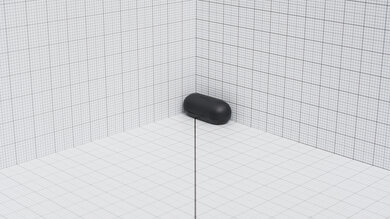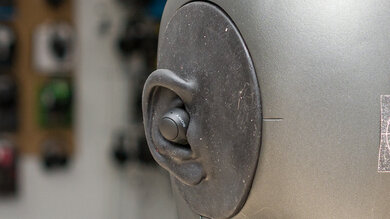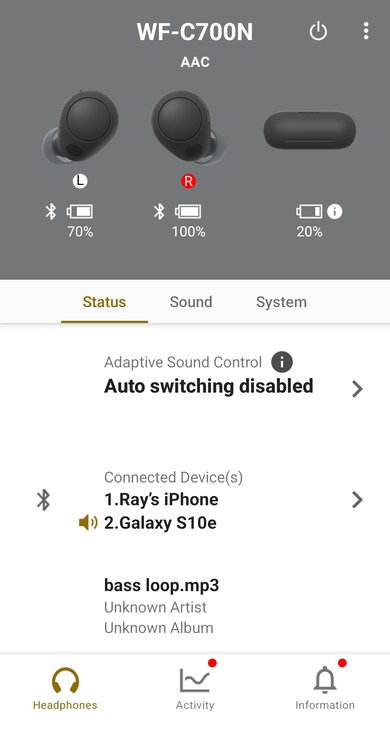While Sony flagships consistently land in the podium rankings for best noise cancelling, the Sony WF-C700N Truly Wireless represent the affordable end of the spectrum featuring active noise cancellation (ANC). The effortlessly pocketable package is lightweight and kitted with an IPX4 rating against water splashes for the buds, allowing you to run for the bus in the rain and reduce the noise of your commute. So how much does Sony's tech-savvy trickle down into its more entry-level range of true wireless earbuds?
Our Verdict
The Sony WF-C700N are decent for neutral sound. Their default sound profile is slightly warm and has enough bass to provide ample thump and rumble to hip-hop and EDM. Voices and instruments sound clear and detailed, but the highs are dark and somewhat veiled. Fortunately, the companion app lets you change the sound to your preferences via graphic EQ and presets.
-
Graphic EQ and presets in-app.
-
Bad passive soundstage.
The Sony WF-C700N are good for commuting and travel. Their lightweight build won't put undue pressure on your ears, and their long continuous battery life will last you a long bus ride or flight. Their in-ear design also won't leak any audio to passengers around you. While their ANC does a good job of isolating you from background conversations, it's less impressive at reducing the rumble of a loud bus or plane engine.
-
Lightweight and decently comfortable.
-
Long continuous battery life.
-
ANC can't block out low-frequency noise very well.
The Sony WF-C700N are great for sports and fitness. Their lightweight build and stable in-ear fit will keep them in place during a brisk jog or moderate workout. They don't have stability fins, so more intense workouts will displace their fit, requiring readjustment to make them sit comfortably again. Their battery lasts nearly eight hours per charge, and they have an IPX4 rating against water splashes, so you can take them on long hikes without worrying about damage. Their ANC doesn't do a great job cutting out ambient noise from loud traffic or passing buses and trucks.
-
Lightweight and decently comfortable.
-
Rated IPX4.
-
Stable in-ear fit.
-
ANC can't block out low-frequency noise very well.
The Sony WF-C700N are decent for use at the office. They barely leak any audio, and their ANC does a good job of cutting out coworker chit-chat and whiny PC fans. Their lightweight and deep in-ear fit makes them comfortable enough for all-day wear, but using the control scheme can create a suction-like feeling in your ear canal, which can be annoying. Depending on use, it's not likely that their roughly 8-hour battery will make it through a whole shift without needing a recharge.
-
Lightweight and decently comfortable.
-
ANC can't block out low-frequency noise very well.
The Sony WFC700N are Bluetooth-only headphones; their latency is too high for wireless gaming. They also lack a gaming mode and low-latency codecs to mitigate audio/video lag.
The Sony WF-C700N are truly wireless Bluetooth headphones; you can't use them wired.
The Sony WF-C700N are okay for calls. The mic makes your voice sound clear, if lacking body. Their isolation helps you to focus on a call without too much outside interruption from passersby. They don't leak too much audio, which keeps the call private. However, the mic tends to pick up background noise and makes your voice sound unclear when it tries to filter out the noise, and the caller will hear quite a bit of your environment.
-
Lightweight and decently comfortable.
-
ANC can't block out low-frequency noise very well.
- 7.4 Neutral Sound
- 7.7 Commute/Travel
- 8.2 Sports/Fitness
- 7.3 Office
- 5.8 Wireless Gaming
- 5.6 Wired Gaming
- 7.1 Phone Calls
Changelog
- Updated May 07, 2024: This review has been refreshed and updated to reflect the current guidelines.
- Updated Mar 20, 2024: We've updated this review to indicate that, with firmware update 2.0.0, these earbuds now have Bluetooth Multipoint compatibility. We've adjusted their score in Bluetooth Connectionas a result and updated the text to mention this.
- Updated May 18, 2023: Review published.
- Updated May 08, 2023: Early access published.
- Updated May 01, 2023: Our testers have started testing this product.
Differences Between Sizes And Variants
The Sony WF-C700N come in four color variants: 'Black', 'White', 'Sage Green', and 'Lavender'. We tested the 'Black' variant, and you can see our unit's label here. If you come across another variant, please let us know in the forums, and we'll update our review.
Compared To Other Headphones
sameThe Sony WF-C700N are noise cancelling wireless Bluetooth earbuds. Essentially, they're an upgraded version of the Sony WF-C500 Truly Wireless, with better controls and ANC. Compared to more expensive earbuds in Sony's lineup, like the Sony LinkBuds S Truly Wireless, which have better ANC and a longer continuous battery, the WF-C700N don't reduce as much noise, and their charging case only stores one extra charge. Still, you can access the same app from the manufacturer, including their virtual surround sound feature and an equalizer to fine-tune their sound.
If you're interested in a pair of wireless earbuds, check out our articles on the best wireless Bluetooth earbuds under $100, the best earbuds for running, and the best noise cancelling earbuds.
The Beats Studio Buds True Wireless and Sony WF-C700N Truly Wireless are both geared as value-driven earbuds with noise cancelling, although neither have exceptional ANC. Both are comfortable, use buttons for controls, and have IPX4 ratings against water splashes. The Beats have a more neutral sound profile with better clarity for vocals and cymbals, but less boom and thump, and you can't customize the EQ in their more basic app. The Sony also has multi-device pairing, which the Beats can't do. You also get more control via the Sony app with a comprehensive equalizer. The Sony's continuous battery life is much longer than the Beats, although you get close to the same amount of total battery life if you include charges stored in the case of both.
The Sony LinkBuds S Truly Wireless are better than the Sony WF-C700N Truly Wireless. The LinkBuds S' ANC does better to cut out low-frequency noise, like a passing truck or loud bus engine. They're also more comfortable since their touch controls don't require as much pressure to activate them, unlike the WF-C700N's physical buttons, which can create a plunging feeling in your ear canal. While both buds last around the same time on a single charge, the LinkBuds S have just over double the extra charges in their carrying case. Both headphones' mixes can be changed via the companion app's graphic EQ and presets.
The Sony WF-C500 Truly Wireless and the Sony WF-C700N Truly Wireless are extremely similar headphones. Their design and build quality are nearly identical, but the WF-C700N has active noise cancellation (ANC). This lets them cut out more background noise than the WF-C500 can passively. However, this impacts their battery life, and the WF-C700N only lasts half as long on a single charge as the WF-C500.
The Sony WF-1000XM5 Truly Wireless are better by most measures than the Sony WF-C700N Truly Wireless. The WF-1000XM5's noise cancelling and isolation performance is in a different class and handily reduces plane and bus engines well, alongside chatter and clinking glasses. They use touch controls instead and are a bit chunkier, although not large. Of the two models, only the WF-1000XM5 supports the LDAC codec for higher-quality audio. Both have the same IPX4 rating and use the same app, although the WF-1000XM5 Truly Wireless have an expanded feature set for customizing controls. While both have similar continuous battery lives, the WF-1000XM5 case stores an extra full charge. Both are comfortable to wear and stable.
The Sony WF-C700N Truly Wireless and Samsung Galaxy Buds FE stand as value-driven options with noise cancelling features. The Sony headphones include a greater IPX4 rating against water, a longer continuous battery life, straightforward controls, and a virtual surround sound feature. They also have multi-pairing for up to two devices. However, their noise cancelling isn't as strong as the Samsung earbuds' ANC. The Samsung headphones also sound good but with a more rudimentary EQ. They include Samsung's proprietary adaptive codec for use with the brand's phones. Their built-in stability fins are great for ensuring a secure fit for some people's ears but aren't enough for everybody. They also have a lesser IPX2 rating and a shorter battery life to a single charge, but more charges stored in the case than the Sony model.
The Anker Soundcore Liberty 4 NC Truly Wireless and Sony WF-C700N Truly Wireless are both budget-friendly noise cancelling earbuds with the same IPX4 rating against water. The Anker have more effective ANC with adaptive modes. They sound more excited by default but have EQ in the app to adjust to taste. Their controls are touchpads, their case is chunky but shorter, and the buds have stems. The Sony are light with fewer charges in their case. Their companion app has a virtual soundstage which is more capable than the Anker's but requires compatible streaming service support. They use buttons for the controls instead of touchpads. Their ANC, unfortunately, is less impressive, but it isolates high-pitched noise well.
The Sony WF-1000XM4 Truly Wireless are better earbuds than the Sony WF-C700N Truly Wireless. The Sony WF-1000XM4 have a better build quality, better-performing ANC, and a longer-lasting battery, and they come with multi-device pairing. However, if noise cancellation isn't a priority to you, there are advantages to the less expensive WF-C700N that still make them worth considering. They have a better-performing mic, a more intuitive control scheme, and a much more neutral default sound profile, which some users may prefer.
The Jabra Elite 4 Active True Wireless are better sport earbuds than the Sony WF-C700N Truly Wireless. Both buds are comfortable, lightweight, and well-built, but the Jabra are more resistant to the elements thanks to their IP57 rating, which protects them against brief immersion in water. The Sony's IPX4 rating only protects them against splashes, and they can still get damaged if briefly dropped in a nearby puddle. While the Jabra and Sony have the same continuous battery life, the Jabra's carrying case holds three charges compared to the Sony one, meaning you can use them for longer before recharging their case.
The Jabra Elite 4 True Wireless earbuds are better than the Sony WF-C700N Truly Wireless. The Jabra's ANC does a better job at isolating you from office-type noise, like chatty coworkers or loud AC units, though they struggle just as much as the Sony at cutting out bassy noise from transit vehicles. The Jabra also have a higher IP rating for better protection against the elements during outside runs and a better-balanced sound profile, making them more versatile for listening to different audio content. That said, even with the ANC off, they have a high noise floor, so audio won't sound as clear during playback. However, the Sony last longer on a single charge, though the Jabra's case holds more extra charges and has a longer total battery life.
The Samsung Galaxy Buds2 Truly Wireless and Sony WF-C700N Truly Wireless are both very portable with balanced default sound profiles, virtual surround sound, and noise cancelling in common. The Samsung sound a bit brighter by default, and their app only has EQ presets. They filter more low, rumbling engine noise and midrange traffic sounds than the Sony. They also use touch controls instead of buttons, and with compatible Samsung devices, they can connect using the brand's proprietary codec. On the other hand, their continuous battery life is significantly shorter than the Sony's but is similar overall if you include the charges. The Sony have a warmer sound profile, and the app's equalizer is more comprehensive. While their noise cancelling is useful, it's not as effective. Their case is a bit more fiddly to open, too. The buds use buttons that are harder to accidentally trigger than the touch controls on the Samsung, but they can also push the earbuds in deeper when you use them.
Video
Test Results
The Sony WF-C700N have a similar design to the Sony WF-C500 Truly Wireless. They're round buds with a monochromatic design and minimalist profile that doesn't protrude much from your ear. Unlike the more premium models in the brand's line-up, which use touchpads, these have physical buttons taking up the majority of the outer face of each bud's housing. They come in four color variants: 'Black,' 'White,' 'Sage Green,' and 'Lavender.'
The Sony WF-C700N are decently comfortable. While they're lightweight and fit deep in-ear, using the control scheme can put extra pressure on the buds and create a suction feeling in your ear canal. Because fit and comfort vary between everyone, the seams of the housing can be felt by some wearers. They come with three ear tip sizes to help you get the best fit possible.
The Sony WF-C700N's control scheme is easy to learn and intuitive. Each bud has a single large button. The buttons have good clicky feedback and don't press in far or require much force. You can use the controls to skip tracks, play and pause audio, and answer, reject, and end calls. Control remapping is done in their companion app but is limited to trading default commands for listening modes and volume controls. Additionally, the buds only give input chimes when using ambient sound controls.
On the left earbud:
- Single press: Toggles between ANC/transparency modes. You can turn ANC off for a normal mode, but you have to enable that function via the companion app.
- Double press: Answers and ends calls.
- Press and hold: Rejects incoming calls.
On the right earbud:
- Single press: Plays and pauses audio.
- Double press: Plays the next track. Also answers and ends calls.
- Triple press: Plays the previous track.
- Press and hold: Activates the voice assistant. It also rejects incoming calls.
The Sony WF-C700N's charging case is good. A single LED on the front of the case indicates the battery level and there's a Bluetooth pairing button on the back. It's a small case with a stable flat bottom, so it won't tip over and opens like a clamshell. The plastic has a pleasant texture but can feel a bit slippery when open because the bottom is shallow compared to the lid, so there's not much to hold on to. The lid also has strong magnets, which can make it a little harder to open, but this can be advantageous as the buds aren't as likely to fall out during an accidental drop. The lid itself feels sturdy, but the plastic has a slight flex when you open the case. It poses no obvious issues, but it's a little cheap feeling.
These earbuds are well-built. They'll survive a few accidental drops without significant damage. Their plastic isn't as dense-feeling as the flagship Sony WF-1000XM5 Truly Wireless, but it's serviceable with no obvious weaknesses. Fortunately, the buds are rated IPX4 for protection against water splashes, so they'll hold up if you get them a little wet. The silicone ear tips, however, feel very thin and prone to tearing over repeated use.
The Sony WFC700N's stability is good. Their deep in-ear fit and lightweight build won't move significantly during moderate exercise. However, they can get dislodged from your ear canal during more intense movement, requiring readjustment to get a comfortable fit. Due to their shape, if you have smaller ears, they might be a good pick, while those with larger ears can find the buds can shift a bit over time if you're out walking, but they don't fall out. They can jostle slightly if you go for a run because they lack stabilizers.
The Sony WF-C700N have a warm sound profile. Their default tuning is versatile for pop, rock, jazz, and podcasts. The bass range has plenty of thump and punch, while the mids aren't cluttered, so vocals and instruments sound clear and present, if a little dark due to an underemphasized treble range. The de-emphasized treble causes sibilants, like cymbals (and S and T sounds), to come across as somewhat dull and veiled. Fortunately, you can adjust their sound using their companion app's graphic EQ and presets. The curve you're working with from the start is an easier one to coax and fine-tune as it's not particularly extreme in any regard.
These earbuds have fantastic frequency response. You get a predictable sound with each wear. Once you get a good fit and seal, you'll receive consistent bass and treble delivery each time you use them.
They have incredible bass accuracy. The range is very flat and well-balanced, so the mix has ample thump, punch, and boom without overpowering the rest of the mix. A slight under-emphasis in the lowest bass frequencies won't impact the bass much at all, given that the majority of the frequencies that constitute the groove of a bassline or the thump of a kick drum occupy mid and high-bass registers.
The Sony WF-C700N have superb mid-accuracy. A dip in the mid-mid pushes vocals and instruments into the back of the mix, but only very slightly. They still sound clear, present, and detailed.
These earbuds have good treble accuracy. In songs like Dynamite by Taio Cruz, the vocals and synths sound a bit veiled and lose some of their detail, while sibilants, like cymbals, sound dull and lispy.
The Sony C700N's peaks and dips performance is decent. They control their own sound profile well, except in the treble range, where they exhibit stronger peaks. A small peak in the bass range adds extra thump and rumble to the mix. A slight dip in the middle of the midrange pushes leads and vocals back slightly in the mix. The peak in the mid-mids into the high-mids adds slight boxiness and harshness to vocals. Most noticeable, though, is the peak throughout the mid-treble, which makes sibilants, like cymbals, sound piercing.
Imaging performance is decent. Sony tends to have good quality control and ergonomics. While our unit's L/R drivers have phase response and group delay mismatch in the high-treble, it's not noticeable with real-life content since this range isn't audible for most people, and there's often not much audio content included that high. The mismatch in the phase response's mid-mid shifts those frequencies towards the right slightly, but it's extremely difficult to notice with real-world content. Otherwise, they're well-matched in amplitude and frequency, which helps ensure a balanced and stable stereo image. For the most part, group delay is well-matched, too, ensuring tight bass, although the peak in the treble still has a small impact on imaging transparency. However, imaging varies between units.
These closed-back earbuds have a terrible passive soundstage, which is expected with their closed-back and in-ear design. As a result, their soundstage doesn't sound immersive or open. It feels like audio comes from inside your head rather than all around the room.
These earbuds are compatible with Sony's 360 Reality Audio feature via their companion app. However, you must be subscribed to a compatible streaming service to use them, like Tidal or 360 by Deezer. When you use it, the app analyzes your ear shape and creates a virtual soundstage for a more immersive listening experience. You don't get any head-tracking if you want to feel like you're moving within a surround sound space.
These earbuds have reasonable weighted harmonic distortion performance. Acceptable amounts of distortion are present across the whole range, but it's not audible with real-life content. The treble region sees the most distortion, which can add slight unwanted distortion. Fortunately, most people find the upper treble range difficult to hear, so you'll experience mostly clean and pure audio reproduction in daily listening.
These are the settings used to test the Sony WF-C700N. Our results are only valid when used with these settings.
The noise isolation performance is decent. While their active noise cancelling (ANC) cuts out deep rumbles from bus engines and tempers midrange noise traffic din, it's not a drastic improvement over the passive isolation gained by a good in-ear fit. It's also inconsistent, as the ANC doesn't filter out some boomy noises. In the case of trebly noises like a clatter, the ANC doesn't cancel out the noises and can reintroduce noise that passive isolation ordinarily blocks. This tends to happen with sudden, shrill, and non-repeating noises, as the ANC can't necessarily react quickly enough.
The leakage performance is excellent. Escaping audio is mainly concentrated in the bass and treble ranges but is hard to hear unless you're in a very quiet environment. If you like to crank your tunes, you won't need to worry about disturbing coworkers or commuters.
The integrated mic performance is satisfactory. Your voice sounds clean and understandable but somewhat thin and lacking body.
Noise handling performance is unremarkable. In moderate and loud environments, background noise is suppressed somewhat, but it's still present and annoying, even if your words are intelligible. Loud and sudden noise, like a passing train, will drown out most of your voice, making your speech difficult to understand.
The Sony WF-C700N's battery performance is reasonable. Sony advertises 7.5 hours of continuous playback time with the ANC on, and we measured just shy of eight hours. Their carrying case only holds one extra charge, which is less than the Sony LinkBuds S Truly Wireless. Thankfully, they feature an auto-off timer to save power. Keep in mind that battery life varies depending on use. According to the manufacturer, 10 minutes of charging yields an hour of playback in a pinch.
The Sony | Headphones Connect app is great. There are a ton of extra features available in this app. You can monitor the battery life of each bud and the case, adjust the mix via graphic EQ and presets, customize button functions and playback controls, and much more. You can see how some features work here. Unlike the premium Sony WF-1000XM5 Truly Wireless, select features like control remapping have more basic implementations, but it's still pretty packed.
The Sony WF-C700N's Bluetooth performance is great. As of firmware 2.0.0, they support multi-pairing with two devices. You can enable this feature in the app, under system settings. Their latency is somewhat high, however, so if you're hoping to game or stream videos on your phone, you'll likely experience sync issues, although it's not the worst we've seen. Latency can vary between devices, and some apps compensate. Unlike the Sony WF-1000XM5 Truly Wireless, they don't have the brand's proprietary Bluetooth codec, LDAC, which can transmit high-resolution audio via compatible devices compared to the default SBC codec.
These earbuds have full voice and audio compatibility with PCs via Bluetooth.
Comments
Sony WF-C700N Truly Wireless: Main Discussion
Let us know why you want us to review the product here, or encourage others to vote for this product.
Update: The following test groups have been updated following TB 1.6: Bluetooth Connection. There have also been text changes made throughout the review, including to the usages to match these results.






























































































